A childhood friend of The Sapling’s lead editor takes it upon herself to fabricate an interview which is either embarrassingly or honourably accurate: you decide.
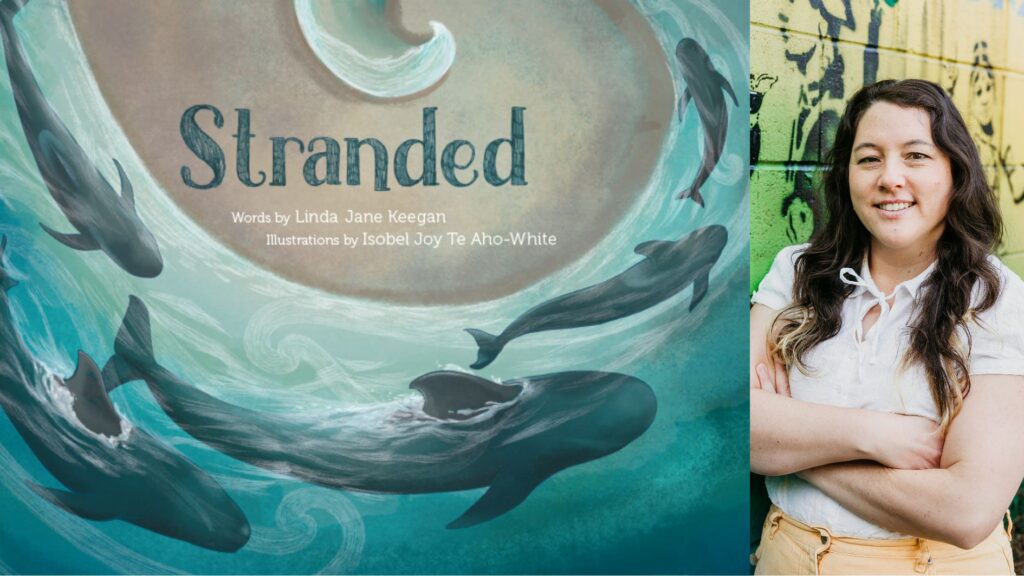
I meet Linda Jane Keegan at her home in Tākaka. Or at least I would have, if this were a real interview. She is the author of two previous picture books (Things In The Sea Are Touching Me! and Kororā and the Sushi Shop), and is just about to release a third, Stranded, which tells the story of a whale who beaches itself, and its subsequent refloating. It would make sense to interview her for The Sapling, since we generally cover newly released Aotearoa NZ picture books, especially from authors who have successful previous titles. But in the time-honoured NZ tradition of “just a big little country,” Linda Jane is both a children’s book author… and the lead editor of a children’s book review site. This children’s book review site. A site which, entirely by chance, I, Annelies Judson, childhood friend of Linda Jane Keegan, have been writing reviews for since long before she became the editor. Therefore, in an attempt for The Sapling team not to be accused of nepotism, favouritism, or arse-kissing, I have entirely made up the following interview. Any resemblance to real people or events is entirely intended.
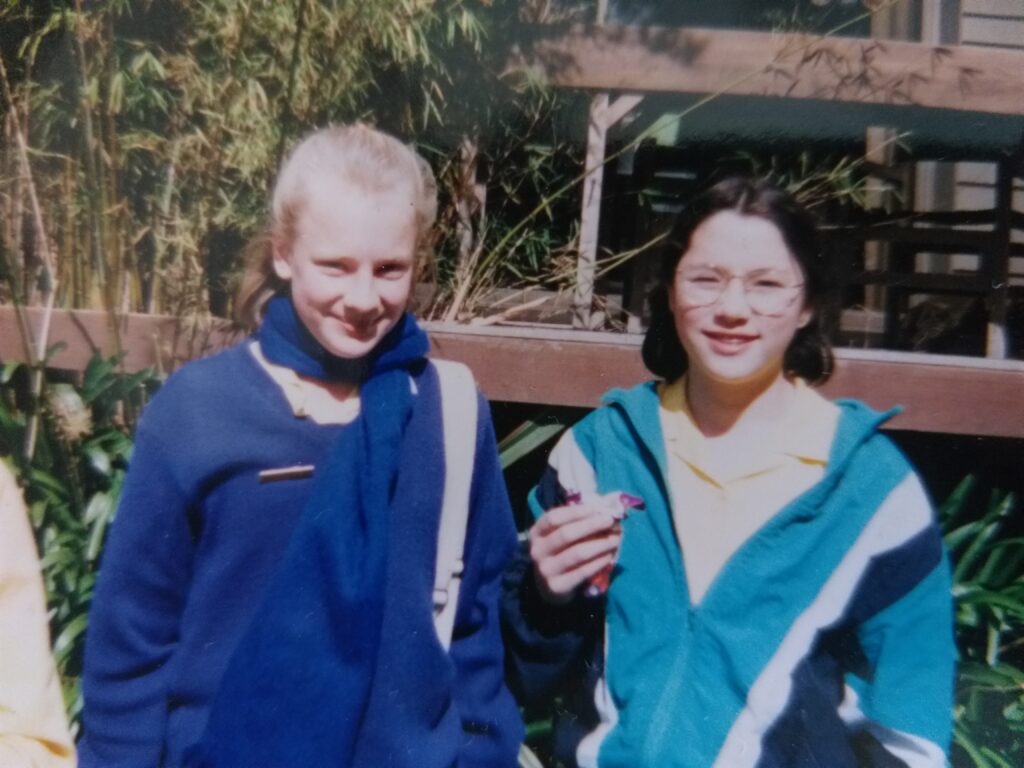
So: I meet Linda Jane Keegan at her home in Tākaka. There is a Green Party election hoarding on her fence. On her section there are chickens, a small stream, and a hill of mānuka trees. This makes sense. Keegan has spent significant chunks of her adult life working in outdoor education. She has a degree in ecology. She volunteers for Project Jonah. She is mixed race, queer, and proud of it. The social justice, eco-focus and climate advocacy of the Greens make them a logical political choice. But how does she feel about so openly supporting a political party in an area known for its anti-establishment, anti-government sentiment?
“What are you doing in my house?” she asks me.
“You’re just a figment of my imagination,” I tell her. “Can you answer the question?”
She looks slightly put out to be considered merely a figment, but deigns to answer my question anyway. “It’s important to me that people know where I stand,” she says. “Social action has been a part of both of my first two books. Things In The Sea Are Touching Me! has a child with two mums, and I pushed back on my publisher about not using gender inclusive pronouns in Kororā and The Sushi Shop. I’m an activist at heart. But I don’t really have the spoons right now to do much activism…the least I can do is to put a sign on my gate.”
Therefore, in an attempt for The Sapling team not to be accused of nepotism, favouritism, or arse-kissing, I have entirely made up the following interview.
Keegan is right. She is a busy woman. As well as writing children’s books and editing The Sapling, she also works as a library assistant at the Tākaka Library and sometimes does research for academic articles. (She is what my high school economics teacher would have given as an example of ‘vertical integration’.) She does all this while being a parent to a seven-year-old and managing some chronic mental health conditions, and taking part in imaginary interviews about her writing. It’s a wonder she has the spoons to do anything.
“Well, some days I don’t,” she laughs. “I wish I could get outdoors more too, but there are days where it’s just in the too-hard basket. It’s difficult, because I get so much from being outside in terms of wellbeing, so when I do manage it, it’s amazing. And living in Golden Bay there are so many opportunities to do things in the outdoors.”
One of those opportunities is volunteering for Project Jonah. Mass strandings are a regular occurrence on Te Onetahua/Farewell Spit, and the team of volunteers from the Golden Bay area are essential when the team are attempting to refloat a pod of beached whales. It was this mahi that led Keegan to the plot of Stranded, which is told from the point of view of an upokohue/long-finned pilot whale that was part of a pod that stranded at Te Onetahua in February 2021.
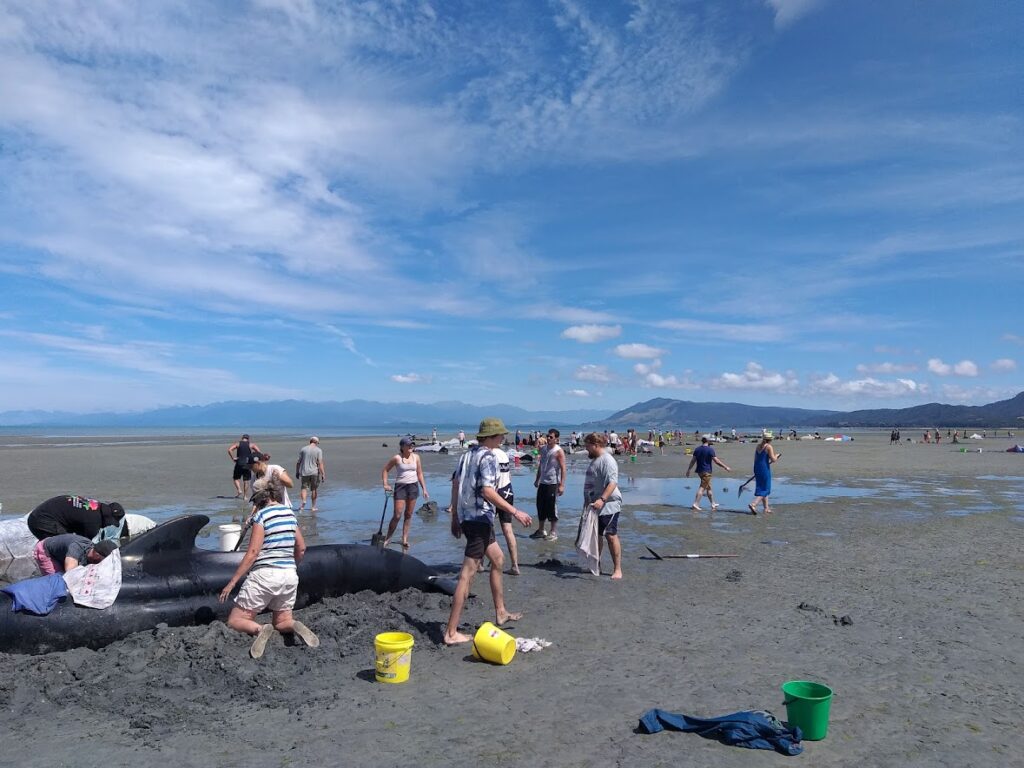
‘Own voices’ is a big movement in publishing at the moment, so I put it to Keegan: What gave her the chutzpah to think she could write from a whale’s perspective, when whales aren’t part-Singaporean, queer, or even human?
“Actually,” Keegan lectures me wryly, “Whales have been known to display homosexual behaviour.”
Funnily enough, I do know this.
“Seriously though, it was an interesting challenge, writing from a whale’s perspective. Because you have to think not just only of what the whale might see or do, but also how it would sound, you know, it’s voice. Is it lyrical? Is it austere? When you are with one of these creatures on the sand, trying to refloat it, they’re at their worst, you know? They are majestic and helpless at the same time. So you want to get that across…but also think about what it’s like before they strand, after they’ve refloated, what kind of mana they have…there’s a lot to think about.”
What gave her the chutzpah to think she could write from a whale’s perspective, when whales aren’t part-Singaporean, queer, or even human?
The text also acknowledges the loss of whales who don’t survive a stranding–something that Keegan feels is lacking in other books about whale strandings. She explains that the tragedy of losing a whale, and the emotions for the volunteers who have often worked long hours, are captured in emotions she ascribes to the whale who has been refloated, mourning the loss of the others in her pod. Whales, Keegan explains, have kinship ties just like humans. We feel the pod’s loss much more acutely through the voice of the whale than if it was described through the voice of the human volunteers. Not to mention that giving a voice to the whale underscores the way tangata whenua view whales, as taonga and guardians, connected to humans rather than separate from them.
These taonga are beautifully illustrated by Isobel Joy Te Aho-White (Ngāti Kahungunu, Kāi Tahu), whom Keegan contacted directly to see if she was willing to collaborate. This is an unusual opportunity in picture book publishing, but one that Keegan was very glad to be able to take advantage of. “I just love her work and thought it suited the story,” are exactly the words Keegan would have used, and I know this because this is exactly what she emailed me when she told me the book had been accepted for publication.
The book also includes factual information about whales throughout–a nod to Keegan’s scientific-mindedness. Indeed, all of her books so far are related to Aotearoa’s ngāi kīrehe me ngāi tipu (native fauna and flora), and contain elements of fact in the narrative, a chance for Keegan to impart some of her joy for ecology to young audiences.
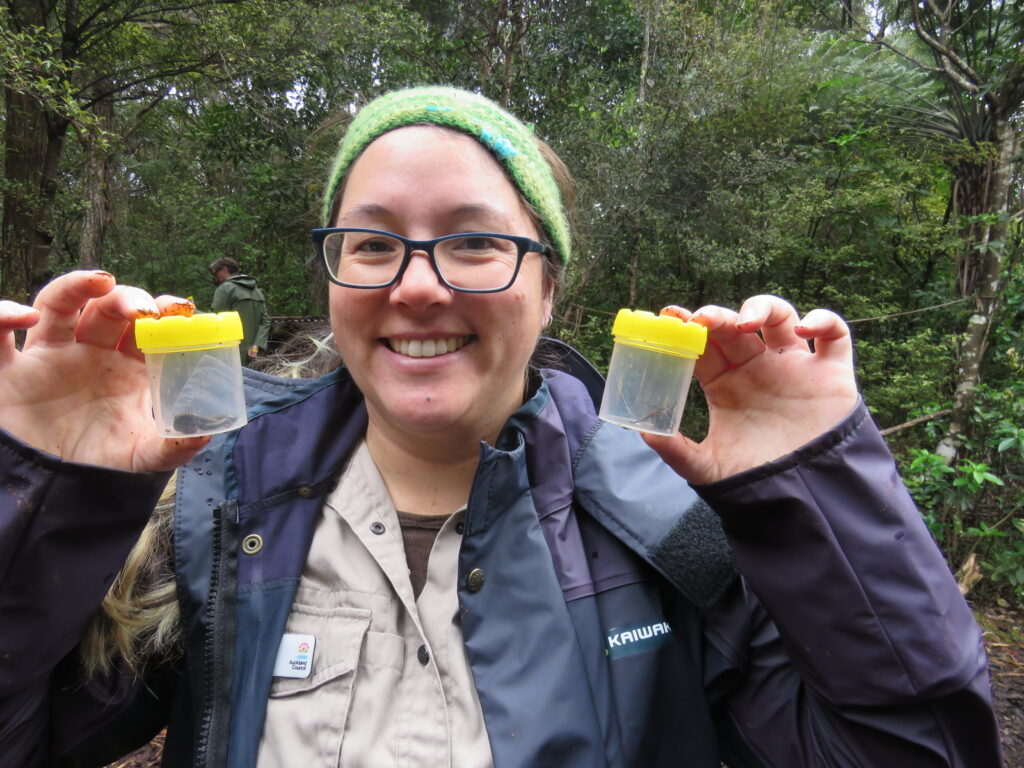
“So, will you do something different next time?” I ask. “I mean, there are things in the world other than New Zealand birds and whales and plants, you know.”
“That’s true,” Keegan says. “But I haven’t covered glow worms, or kauri, or grass, or ecosystems of maunga, or toutouwai, or cabbage trees, or marine gastropod molluscs, or…”
At ‘marine gastropod molluscs’ I decide to ignore Keegan-in-my-mind, partly because a list of her ecological interests could go on forever, and partly because my knowledge of ecology has just about run its course so it’s easier to just imagine that she’s continuing on rather than having to actually start Googling. I say my mental goodbyes and leave her absentmindedly reciting the Latin names of all the species of wētā.
Stranded is being launched in Richmond and Motueka on 5 October, in Tākaka on 6 October, and in Tāmaki Makaurau on 14 October. All are welcome! Event details are available here.
Annelies Judson is not going to be paid for this interview, because a) she also doesn’t want to be accused of nepotism, b) she actually wrote this article without Linda Jane’s knowledge, and c) getting to poke fun at your friends through the medium of an imaginary interview is worth it.
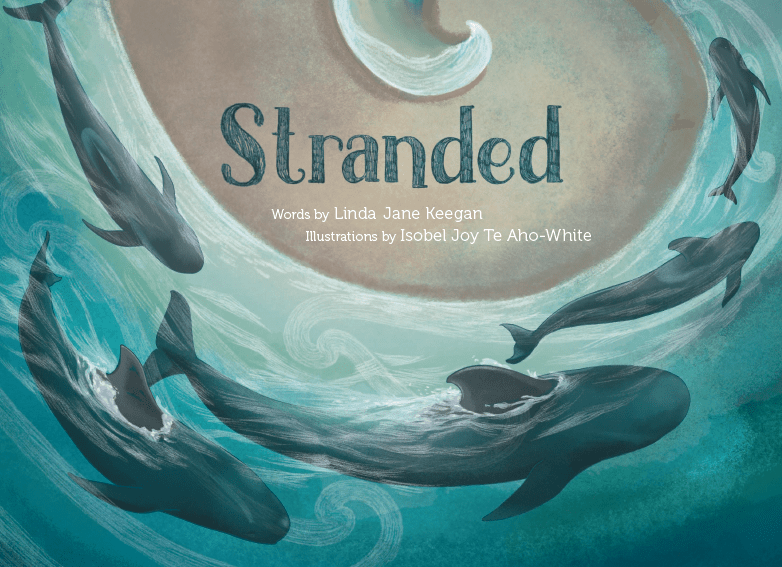
Stranded
Written by Linda Jane Keegan
Illustrated by Isobel Joy Te Aho-White
Published by Bateman Books
RRP: $21.99
Annelies Judson
Annelies Judson writes book reviews and poetry for children, among other things. Her many loves include cooking, cricket, science and the em-dash. She can be found on Twitter/X and BlueSky @babybookdel and on Instagram @annelies_judson_writer. She also has a Substack newsletter starting February 2025, @anneliesjudsonwriter.




